|
|
|
Sort Order |
|
|
|
Items / Page
|
|
|
|
|
|
|
| Srl | Item |
| 1 |
ID:
169363


|
|
|
|
|
| Summary/Abstract |
The main purpose of this article is to examine the absence of political security and its consequences on state security of Ethiopia. The study was conducted through case study design and used qualitative research approach, and key informant interview was held. The main finding of the article is that in Ethiopia there is a prevalence of political insecurity which is committed by government officials via security sectors and which has led to the existence of mistrust on security sectors, the expansion of mob justice and the existences of social insecurity in the state.
|
|
|
|
|
|
|
|
|
|
|
|
|
|
|
|
| 2 |
ID:
046940
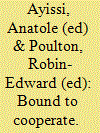

|
|
|
|
|
| Publication |
Geneva, UNIDIR, 2000.
|
| Description |
xv, 206p.
|
| Standard Number |
9290451378
|
|
|
|
|
|
|
|
|
|
|
|
Copies: C:1/I:0,R:0,Q:0
Circulation
| Accession# | Call# | Current Location | Status | Policy | Location |
| 044208 | 303.609664/AYI 044208 | Main | On Shelf | General | |
|
|
|
|
| 3 |
ID:
176216
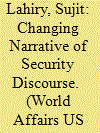

|
|
|
|
|
| Summary/Abstract |
Security discourse has radically changed over the years, especially since the Post–Cold War period. The traditional concept focuses on state security and national security, and is essentially based on realist and neo-realist paradigms. However, in 1994, the United Nations Human Development Report for the first time elaborated the notion of human security and the associated Human Development Index (HDI). Human security advocates a people-centric approach to security. The two foundational principles on which human security is based are “freedom from fear” and “freedom from want.” I evaluate the notions of state security versus human security and examine how South Asian countries have fared regarding the human security indices. I conclude that, despite advances in some areas, various HDI parameters show that the human security record is still rather dismal in South Asia. There remains a critical need to improve it.
|
|
|
|
|
|
|
|
|
|
|
|
|
|
|
|
| 4 |
ID:
144845


|
|
|
|
|
| Summary/Abstract |
State security is a key concern for countries when dealing with transboundary river governance issues. While there is a considerable amount of literature on transboundary river cooperation in general, there has been little on transboundary cooperation and the damming of shared rivers in terms of their impacts on state security. As a result, this article seeks to answer the following questions in relation to the lower Mekong basin: (i) How is the damming process embedded in transboundary cooperation? (ii) How does this type of cooperation contribute to peace and security in the study area – the 3S river basin? And, (iii) how can transboundary cooperation be improved so as to address state security issues? To answer these questions, this study reviews the relevant literature and uses two case studies, one of the Yali Dam in Vietnam and the second of the Lower Sesan 2 Dam in Cambodia. In doing so, the article examines dam developments in the lower Mekong basin, their environmental and human security impacts, and how they contribute to or threaten state security in Cambodia. It concludes that dams on international rivers induce insecurity among states downstream and that cooperation between riparian states is key to addressing this insecurity.
|
|
|
|
|
|
|
|
|
|
|
|
|
|
|
|
| 5 |
ID:
078776
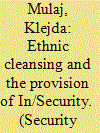

|
|
|
|
|
| Publication |
2007.
|
| Summary/Abstract |
The phenomenon of ethnic cleansing has either been considered by analysts from the point of view of history, or (ethnic) nationalism, or interpreted as the dark side of democracy. Underemphasized in the literature has been the link between the expulsion of targeted communities and the policy and practice of security. Yet, at various times, ethnic cleansing has been used as a security-creation mechanism in the process of nation-state building. Prioritization of the state in security policy and practice has provided justification for drastic measures against targeted peoples. This article seeks to offer a critique of the official rationale for the expulsion of targeted communities in terms of security. It contends that ethnic cleansing is flawed as a means of securing national security. Indeed, not only has ethnic cleansing resulted in humanitarian catastrophe, but the attainment of its stated objective - namely, the provision of security - can be unfeasible. Although state security remains an important value, its acquisition may no longer be justified independently of the means employed in its pursuit.
|
|
|
|
|
|
|
|
|
|
|
|
|
|
|
|
| 6 |
ID:
085679


|
|
|
|
|
| Publication |
2009.
|
| Summary/Abstract |
Does the security of women influence the security and behavior of states? Existing evidence linking the situation of women to state-level variables such as economic prosperity and growth, health, and corruption is fairly conclusive. Questions remain, however, concerning the degree to which state security and state security-related behavior is linked to the security of women. The "women and peace" thesis draws upon evolutionary biology/psychology for ultimate causes of this linkage, and sociological theories of social diffusion and psychological theories of social learning for more proximate causal mechanisms. Together, a new data resource-the WomanStats Database-and conventional methodology find a robust, positive relationship between the physical security of women and three measures of state security and peacefulness. In addition, a comparison of this proposition to alternative explanations involving level of democracy, level of economic development, and civilizational identity shows that the physical security of women is a better predictor of state security and peacefulness. Although these results are preliminary, it is still possible to conclude that the security of women must not be overlooked in the study of state security, especially given that the research questions to be raised and the policy initiatives to be considered in the promotion of security will differ markedly if the security of women is seriously considered as a significant influence on state security.
|
|
|
|
|
|
|
|
|
|
|
|
|
|
|
|
| 7 |
ID:
095892


|
|
|
|
|
| Publication |
2010.
|
| Summary/Abstract |
Unregistered non-government organizations (NGOs) in China either have no legal support or are strictly restricted by law. In practice, however, a large number of both foreign and domestic NGOs without a legal status exist in China.This article argues that one of the reasons for the Chinese government's tolerance of this situation is because the government uses hidden rules that are not stated in the current laws and regulations to manage such NGOs.
|
|
|
|
|
|
|
|
|
|
|
|
|
|
|
|
| 8 |
ID:
057019


|
|
|
| 9 |
ID:
130224
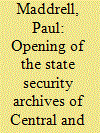

|
|
|
|
|
| Publication |
2014.
|
| Summary/Abstract |
Laws passed since 1991 1 have opened the state security archives of the former Communist states of Central and Eastern Europe. Such legislation is in place throughout the former Soviet Bloc, but the focus here is on the opening of the German and Romanian archives. The process is far advanced in Germany and much less so in Romania. The contrast between the two very well displays the issues involved.
The opening of the archives has been an important tool of de-Communization. The process has been fullest in Germany because of the strength and self-confidence of the German legal system and because of the weakness of the Communists' political position. It has been partial in Romania because the legal system there lacks authority, independence, and self-confidence, and the Communists have remained strong.
Important differences exist between the various former Soviet bloc countries, but, generally speaking, the institutions which now hold the Communist-era state security records have four tasks:
1. to enable the connections of public officials with the former Communist security and intelligence services to be investigated so that those who collaborated with those services can be removed from public office ("lustration," as it is called);
2. to make available to targets of Communist-era surveillance and repression the records held on them;
3. to make records available for the prosecution of those who committed crimes during the period of Communist rule; and
4. to enable historians and journalists to write the history of Communist surveillance and repression more accurately and fully.
These four tasks serve the purposes of building stable democratic institutions which enjoy public trust, and of giving victims of the Communist security services a measure of retrospective justice.
|
|
|
|
|
|
|
|
|
|
|
|
|
|
|
|
| 10 |
ID:
123205
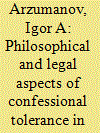

|
|
|
| 11 |
ID:
154252


|
|
|
|
|
| Summary/Abstract |
According to the mainstream understanding of international relations, security depends on power usually defi ned in terms of military power. As per this logic, when states increase the latter, the former should increase. At the same time, power and security are also considered in relative terms and as zero-sum games—states feel more secure when their neighbours are insecure. This article however questions this logic and argues that states would be more secure when their neighbours feel secure from them and in turn would make others feel more secure by controlling and decreasing their armaments. Thus, going against mainstream theories, this paper argues that states could increase security by reducing defence expanditure. It compares security levels of different states and their defence expenses. It concludes that the security of those that spend larger amounts on their military tends to be lower than it is for those with smaller military budgets and analyses reasons for this paradoxical outcome.
|
|
|
|
|
|
|
|
|
|
|
|
|
|
|
|
| 12 |
ID:
158457


|
|
|
|
|
| Summary/Abstract |
State security and survival are critical issues in the rough regional environment of the Horn of Africa. Ensuring security for a state and its population is a priority and a raison d'ětre for any government. The buffer zone has emerged as a key strategy for nations in the Horn of Africa to manage successfully the security challenges of the several failed states in their neighborhood. Buffer zones are established adjacent to the borders of stronger states that oversee the buffer zones' affairs directly or through proxies. This essay explores the practical aspects of power asymmetries between successful and failed states from the perspectives of two officials in successful states who deal directly with this security challenge within the constraints of current norms and practices of sovereignty. The situation in the Horn of Africa provides insights into the effects of failed states on the security of their neighbors and the challenges that failed states present to the wider international community.
|
|
|
|
|
|
|
|
|
|
|
|
|
|
|
|
| 13 |
ID:
139696
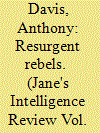

|
|
|
| 14 |
ID:
118725
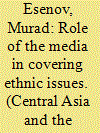

|
|
|
|
|
| Publication |
2012.
|
| Summary/Abstract |
Ethnic conflicts are one of the most problematical and sensitive issues known to the world today. Since World War II, for example, more than 100 armed conflicts have broken out in different parts of the world, most of which are ethnic in nature. These conflicts pose a threat to state security and territorial integrity and, in their extreme form, are accompanied by violence, bloodshed, mass violations of human rights, huge numbers of refugees, significant material losses, and so on.
|
|
|
|
|
|
|
|
|
|
|
|
|
|
|
|
| 15 |
ID:
019089


|
|
|
|
|
| Publication |
March-April 2001.
|
| Description |
3-22
|
|
|
|
|
|
|
|
|
|
|
|
|
|
|
|
| 16 |
ID:
188279


|
|
|
|
|
| Summary/Abstract |
Declassified archive documents from the Ministry of the Interior in Bulgaria were used to examine and analyze the subversive activity of U.S. intelligence against Bulgaria conducted via the scientific exchange of these two countries. These documents expose Bulgarian intelligence and counterintelligence’s interest, methods, means, and approach with the United States during the Cold War. Although U.S. researchers and scholars represented only a small portion of the U.S. citizens temporarily residing in Bulgaria, they were considered the most dangerous because they had access to the Bulgarian cultural and scholarly elite, hence the opportunity to exert political influence on it.
|
|
|
|
|
|
|
|
|
|
|
|
|
|
|
|
| 17 |
ID:
133124
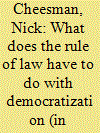

|
|
|
|
|
| Publication |
2014.
|
| Summary/Abstract |
Talk of the rule of law is today ubiquitous in Myanmar. But what does the rule of law mean? And what does it have to do with the country's nascent democratization? One way to conceptualize the rule of law is in terms of substantive legal equality. Burmese farmers and activists mobilizing through the lexicon of law to defend agricultural land against intrusive state projects engage with the rule of law in this sense. Another way is as a language of public and state security. Demands for the rule of law in response to violence in Myanmar's west correspond with this usage. Whereas in established democracies the rule of law as equality complements the rule of law as security, in a democratizing state the two are not necessarily compatible. The rule of law as an idea associated with substantive legal equality contributes to Myanmar's democratization, whereas when associated with public and state security it potentially undermines that democratization.
|
|
|
|
|
|
|
|
|
|
|
|
|
|
|
|
| 18 |
ID:
175497


|
|
|
|
|
| Summary/Abstract |
This article uses the case of Zimbabwe to explore how militarisation endangers both human and state security. While militarisation in Zimbabwe manifested itself in several ways, this study focuses on prioritising military solutions to most of the real or perceived security problems in the country between 2000 and 2008. Using data collected through review of available literature and interviews with officials in the public and private sectors, the article argues that the military-style operations were a threat to order and national security in both the short term and long run because they undermined human security. This is the case despite the fact that the military-style operations, similar to other manifestations of militarisation in Zimbabwe, were mooted and implemented framed in human and state security discourses. The article concludes that the prioritisation of military solutions to every security problem works to safeguard the governing elite but worsens instead of addressing the citizens’ problems with far-reaching implications for human and state security. For human security to be realised, Zimbabwe needs to discontinue militarised governance and capacitate responsible government ministries and departments.
|
|
|
|
|
|
|
|
|
|
|
|
|
|
|
|
| 19 |
ID:
085342


|
|
|
|
|
| Publication |
2008.
|
| Summary/Abstract |
In spite of the full application of all the traditional security measures on the part of Israel in order to achieve security, the majority of Israelis still live in fear. The majority of Palestinians live in fear, too, because of the occupation and Israel's application of these security measures. Thus, neither Palestinians nor Israelis have any sense of security.
|
|
|
|
|
|
|
|
|
|
|
|
|
|
|
|
|
|
|
|
|